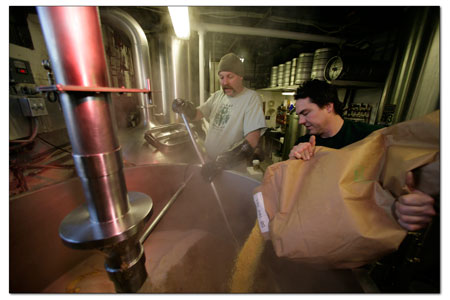Ska’s Bill Graham, left, and Erik Maxson, formerly of Carver’s and now of BREW, tend to the mash while brewing a batch of the Durango Bootlegger’s annual Spring Tonic Elixir. The Spring Tonic is a collaborative effort between all five of Durango’s breweries./Photo by Scott Smit Local brewmance still going strongIn Durango microbrew scene, it’s ale for one and one for ale
by Joy Martin What’s the first thought that comes to mind when you think of Colorado craft beer? For some, it might be “hipster,” “too hoppy” or “expensive,” while others may think “perfect cap to an adventure-filled day.” For the dudes in the biz, however, that depends on who you ask. “Yes, please,” says the scientist, Carver’s Head Brewer Jeff Albarella. “Food,” says the artist, Erik Maxson, owner of BREW Pub and Kitchen. “Respect,” says the punk, Dave Thibodeau, co-founder and President of Ska Brewing.
“A nationwide revolution,” says the believer, Steve Kurowski, who leads marketing for the Colorado Brewer’s Guild and might be craft beer’s proudest cheerleader. Whatever your thoughts, what is found in the froth of a pint glass of Colorado craft beer is nothing less than the embodiment of the passionate spirit that lives in all who thirst in the wild, wild west. Home to 217 of these sudsy businesses, Colorado boasts the third most breweries per state. California has 508, Washington hosts 251, while Oregon nips at our heels with 208. Together, these four states account for one-third of breweries in the United States, according to the Beer Institute, a national nonprofit that represents nearly 3,000 breweries. “With over 2,800 breweries nationwide, palettes and attitudes toward beer are changing, and changing quickly,” says Kurowski. “We’re in the midst of a craft beer revolution.” BREW’s Maxson radically explains it as “trying to end beer racism.” “By exploring the ingredients and focusing on styles, we can turn people onto beer that they would normally not gravitate toward,” he says. “Color doesn’t tell you about the soul of the beer ... You have to get the full story.” Though the numbers for craft beers’ economic impact over the last two years have yet to officially be tallied, Kurowski says more than $500 million in direct revenue is generated through craft beer production annually. Still, no matter their immaculate quality of beer, these grassroots operations hardly dent the corporate armor of the Big Bad Wolves of “Rotgutzen,” a term coined by Ska referring to the kingdom of yellow “beer-flavored products.” Despite its strides in recent years, craft beer still makes up less than seven percent of beer sales in Colorado and only 10 percent nationwide. What they lack in sales, though, microbreweries make up for in impact. The Brewer’s Guild reveals that 65 percent of all beer jobs in Colorado are in the craft community. That’s 6,000 employees. The people who climb on board the craft beer wagon hop on through all sorts of avenues: science, art, cooking, curiosity. But there seems to be one common denominator for success. “Making beer in the basement, that’s Colorado to me,” says Maxson, former head brewer at Carver’s who opened BREW a year ago with wife, Lainie. His theory could be accurate: the epicenter of the Colorado homebrew quake began rumbling from basements of boozy dreamers in the early 1990s. A handful of these mom-and-pops made a go of it and then fizzled out, while others persevered, heralding a growing cry heard round the world (alcoholically speaking). Kurowski’s personal revolution started in 1988 with Denver’s Wynkoop Brewery, which has the distinction of being Gov. Hickenlooper’s joint as well as the oldest brewpub in Colorado. Soon after, Hickenlooper’s amigos, Bill and Jim Carver, opened Carver Brewing Co. in Durango, coined the Southwest’s Original Brewpub.
Turns out Carver’s Head Brewer Jeff Albarella also rose into brewing from the chasms of a cellar, though through his dad’s passion for wine-making. “Wine was always bubbling away in the basement,” says Albarella of his Italian chemist-father. With a background in biology and ecology, Albarella got into homebrewing as a hobby and then one day had an epiphany: he could get paid to make beer. “I would read whatever I could get my hands on and got deeper into it every year. One day, I thought, ‘why are we here? Why are we working in jobs we don’t like?’” he says. So he quit his job as a lab scientist and migrated from the Midwest to eventually fill the spot as Head Brewer at Carver’s when Maxson left to start BREW. Today, Durango boasts five breweries with five different styles but one shared vision: to make good beer and give back to the community. “Durango’s ahead of the rest of the state,” says Ska’s Thibodeau. Back in 1995, Thibodeau founded Ska under the influence of skateboarding, music, comic books and his punk best friend, Bill Graham. Their brainchild dates back to 1985 in Thibodeau’s basement. After school one afternoon while the punks jammed ska grooves, Graham discovered something that changed their lives forever. “Bill found a book called ‘Beer Book’ on my dad’s shelf,” recollects Thibodeau. They opened up the beer-stained pages and found recipes dating back to 1969. The kids read line-for-line the ingredients and processes that could get them drunk if properly fermented. At that time, they could even get their teen-age hands on malt extract from the grocery store. Radical. They took the unearthed treasure to Thibodeau’s father, who smiled and said like any good father would: let’s make some beer. So Graham, Thibodeau and Mr. Thibodeau began brewing what young Thibodeau calls “prison beer” that featured basic, unimaginative ingredients but still induced a liberating high for the under-aged chemists. For their brew sessions, the boys had two rules: to drink their previous batch and to listen to ska music. Thus, when Christmastime came around, they’d slap labels that read “Ska Brew” on bottles and hand them out for presents. The name stuck. Nearly 30 years later, Ska is not only savvy enough to not promote underage drinking but to speak French and boldly compare craft beer’s quality and depth to that of wine. Thibodeau explains one slight addition. “For us, music is our terroir. That energy – punk rock, ska or metal – goes into these beers. They would taste different if it wasn’t for the music,” says Thibodeau. “It’s the energy behind whatever’s the outcome.” When Ska officially launched in 1995, Thibodeau says no one knew what ska music was (by the way, it’s a calypso-style birthed in Jamaica in the 1950s). But that didn’t deter people from buying the sophisticated concoctions. To the cowboys in Vallecito, for example, he’d explain it as an acronym for “Shit-Kickin’ Ales.” They drank it up. Today, Ska’s marketing style has morphed a bit. “We don’t have the luxury as an industry to buy TV ads, sponsor race cars or any of that ... We put a beer in someone’s hand and have a conversation about it,” Thibodeau explains. “Not having big budgets focuses us to connect better with beer-lovers.” And what better way to do that than through a place where folks can mix and mingle? These locales, also known as public houses, or “pubs” for short, date back to Roman times. For centuries, they have served as meeting places for folks to guzzle, gossip and gather. “It’s a place that existed before the internet. People would go to pubs to feel welcome, catch up, enjoy themselves and ultimately understand something about the world around them,” says Maxson, who also confesses to not missing a single episode of “Cheers.” In Britain, pubs became so popular that King Edgar decreed in 965 there could be no more than one alehouse per village. More than 1,000 years later, one watering hole could never suffice for denizens of mountain towns like Durango. From shuffleboard at Durango Brewing Co. to free peanuts at Steamworks, each local pub houses something different for seekers of cold beer and camaraderie. And while it’s a competitive business, success for one is essentially success for all.4 “Brewers have likeminded souls; (brewing) is a thousand-year-old process, and while technology and science have made it easier, the principle behind it hasn’t changed,” says Maxson. “There’s a sense that we’re all going through the same thing, trying to accomplish the same goal. Being able to rely on your competitors is enormous. It’s the brewer’s attitude. I don’t know if he coined it or not, but Dave (Thibodeau) calls it ‘co-opetition,’” he laughs. Rather, the way he sees it, they’re not battling each other but the kingpins of Coors, Miller and Bud, to name a few. “Beer tastes best when it’s found on the block where it’s brewed,” Carver’s Albarella says. “And it puts us closer to the customer. That’s what excites me.” And so the sometimes quiet, sometimes raucous, revolution continues, regardless of what you think about craft beer. And by golly, is it ever inspiring. “Every brewery in Colorado inspires me: putting everything on the line to do what they truly love for a piece of independence and a slice of happiness. It inspires me to tell their stories,” says Kurowski, who also happens to be a former Durangoan and roommate of Ska’s Graham when they started steamrolling their way into one of the greatest jobs ever. But, as Thibodeau points out, it’s also a way to thank those who made it possible. “(Crafting beer) enables us to help out the people in our community. If it weren’t for beer, we wouldn’t be able to help like we do,” smiles Thibodeau, as he heads into another day that most definitely includes at least one good brew. n
|


